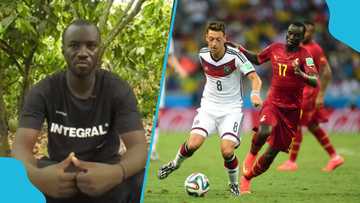Ghanaian Player Rejects Libya’s Nationality Switch, Waiting for Black Stars
- The former Ghana Premier League stars has caused a stir after revealing he refused Libya's attempt to naturalize him
- The midfielder was one of the highly-rated players in the GPL before he moved outside the country two years ago
- Both Libya and the Black Stars of Ghana failed to qualify for the 2025 Africa Cup of Nations
Don't miss out! Get your daily dose of sports news straight to your phone. Join YEN's Sports News channel on WhatsApp now!
Former Asante Kotoko and Medeama SC midfielder, Richard Boadu, has revealed that he rejected an offer to switch his nationality to play for the Libya national football team.
The 26-year-old, who currently plays for Libyan club Al-Tahaddy, made it clear that his decision was driven by patriotism, loyalty, and a desire to represent his native country of Ghana.

Source: Twitter
Richard Boadu's football career
Richard Boadu, known as "Agadas," started his football career in Ghana, where he gained recognition playing for top clubs such as Medeama SC and Asante Kotoko in the Ghana Premier League. His performances in the domestic league caught the attention of international clubs, leading him to sign with Al-Ahly, one of Libya's premier clubs, in August 2023. Boadu’s move to Libya marked the beginning of his international career, as he sought to challenge himself in a new footballing environment.
In February 2025, he was loaned to Al-Tahady, further solidifying his position in the Libyan football scene. Despite the opportunities and financial incentives offered by his club and other parties, Boadu's commitment to his Ghanaian roots remained unwavering.
Libya's attempt to naturalize Richard Boadu
During his time in Libya, who did not qualify for the 2025 AFCON, Boadu revealed that he was approached by Libyan officials who tried to convince him to switch his national allegiance to Libya. The country has a history of naturalizing foreign players to bolster their national team, especially those who play in domestic leagues.
These attempts to lure Boadu into representing Libya were primarily motivated by his potential to strengthen the Libyan national team.
However, the ex-Kotoko man, speaking to Fakye TV, disclosed that he rejected the offer, stressing that his identity as a Ghanaian was far more significant to him than the financial incentives or international acclaim that might come from playing for another country as he waits for his maiden selection to the Black Stars who recently defeatd Chad and Madagascar.
"When I came here, they tried to get me to naturalize for Libya, but I declined. It’s not about the money; I am Ghanaian. I also want to represent my country and feel pride,” Boadu said.
Patriotism Over personal gain
Boadu's decision reflects the strong sense of national pride that many African players hold for their home countries, often despite lucrative offers from foreign nations. His choice underscores the importance of personal and national identity in the world of football, where players are sometimes tempted to prioritize short-term financial gain or career advancement over long-standing cultural and familial ties.

Source: Twitter
It’s not unusual for countries with strong footballing traditions to approach players with foreign connections, particularly those who have made their mark in professional leagues abroad.
However, Boadu’s stance serves as a reminder of the deep connection athletes can have with their countries, and how they may view the honor of representing their national teams as more valuable than any material gain.
What does FIFA's rule regarding nationality switch says?
As of September 2020, FIFA introduced updated regulations to provide clarity and flexibility concerning football players' nationality switch.
According to these rules, a player may request to change their national teams if they have not played more than three competitive senior matches for their current football association before turning 21.
Additionally, these appearances must not have occurred during the final stages of major tournaments like the FIFA World Cup or continental championships.
The rules further suggest that a three-year period must have elapsed since the player's last appearance for their initial national team.
These provisions aim to balance the integrity of international competitions with the personal and professional considerations of the players.
Acclamation for Benjamin Asare of Hearts of Oak
YEN.com.gh earlier reported the loud applause for Benjamin Asare from a section of the Accra Sports Stadium crowd following Ghana's 5-0 win against Chad in a World Cup 2026 qualifier on March 21, 2025.
Nomso Obiajuru was a contributing writer in this article
Source: YEN.com.gh




